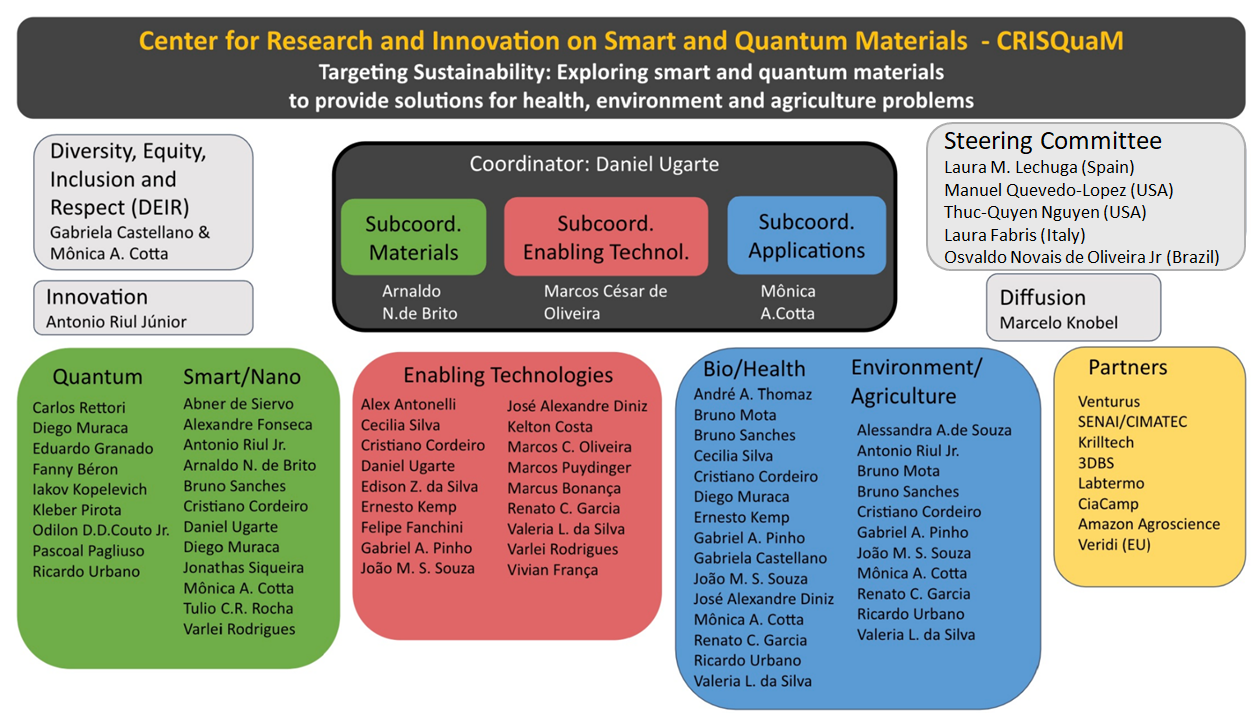BV-FAPESP: research projects supported in this Center
CRISQuaM in the Media: news about the center
CRISQuaM aims to explore the synergistic development of fundamental and applied science to create new materials with high potential for the construction of devices and sensors to address technological challenges related to sustainability, climate change, precision agriculture, ecology, and health. To achieve these goals, we have assembled an interdisciplinary and collaborative research team, integrating expertise across various scientific domains, researching novel materials with high innovation potential. By combining original synthesis methods, advanced characterization techniques, theoretical approaches, computational simulations, quantum technologies, and device construction designs, we aim to drive advances in smart and quantum materials, promoting scientific excellence and technological development. With this, we plan disruptive innovations in instrumentation—including hardware and AI-based tools—as well as in quantum technologies, biomedical devices, and signal processing, in addition to plant bionics, exploring plant-pathogen interactions. Besides research activities, we plan intensive actions in education, dissemination, and communication for the general public, as a modern society should be aware of the challenges humanity faces and how research and technology are essential for responsibly utilizing the planet's limited resources. CRISQuaM's Innovation activities are accelerated through partnerships with several companies in related technologies, many of them Brazilian. Finally, all activities of the Center are managed in accordance with diversity, equity, and inclusion goals and best practices.
The Center brings together scientists, engineers, and innovators in a collaborative effort to apply materials science and quantum technologies at the cutting edge, designing new materials and nano(bio)sensors for advanced diagnostics. The Center has a team capable of producing a wide range of (nano/micro) materials, along with precise chemical and physical characterizations using modern techniques (synchrotron, advanced microscopy, magnetotransport, magnetic resonance, optics, etc.). In addition, the team offers various options in enabling technologies, including miniaturization, processing, and additive manufacturing, as well as instrumentation, quantum sensing, and electronics development. Data analysis will employ updated approaches (numerical simulation, classical and quantum machine learning, and quantum optimization). Applications at the knowledge frontier will address urgent sustainability needs in environmental areas, precision agriculture, plant bionics, and biomedical interfaces, contributing to the development of local technologies in close partnership with the Brazilian industry.
The organization of the Center is based on three pillars — Materials, Enabling Technologies, and Applications — together with partner companies, as described in the figure below.

2023-11-21
The fossil assemblage was found in the state of Rio Grande do Sul, one of Brazil’s richest paleontological regions. The bones belonged to animals that lived between 247 million and 208 million years ago. It is difficult to confirm they can be considered species of dinosaur.
2023-11-15
The Ninth General Assembly of the Global Research Collaboration for Infectious Disease Preparedness, representing funding agencies, research institutions and government bodies from around the world, was held at FAPESP in São Paulo, Brazil, on October 24-25.
2023-11-15
Written by two experts on biofuels, Luís Augusto Barbosa Cortez and Frank Rosillo-Calle, the book explores Brazil’s experience and how other countries can learn from it in the context of climate change.
2023-11-15
The emergence of rabies in distinct wildlife species is a potential source of human infection and poses life-threatening risks. As the researchers responsible for the discovery warn, anyone who comes into contact with these animals should alert the authorities. A 36-year-old farm worker died in May, only weeks after being bitten by a marmoset.
2023-11-14
Scientists at the University of São Paulo’s Center for Research on Redox Processes in Biomedicine used a novel technique they themselves developed to identify altered molecules in an animal model of amyotrophic lateral sclerosis (ALS).
2023-11-08
FGV Analytics is a partnership involving FAPESP, Getúlio Vargas Foundation, the University of São Paulo and the São Paulo State Department of Public Safety. Its mission includes fostering development of evaluation tools and evidence-based public policy.